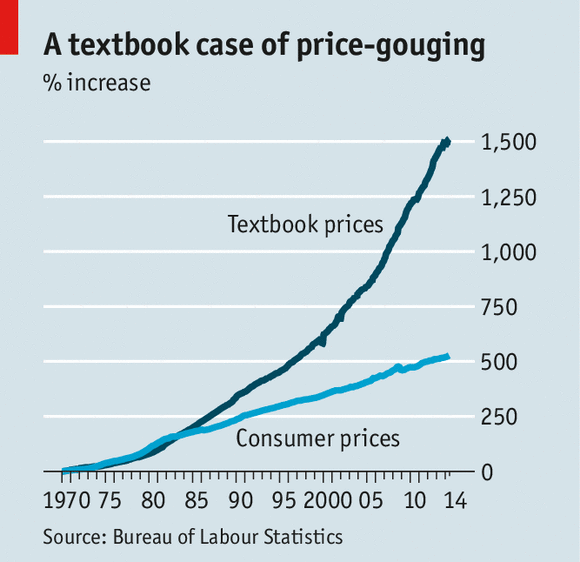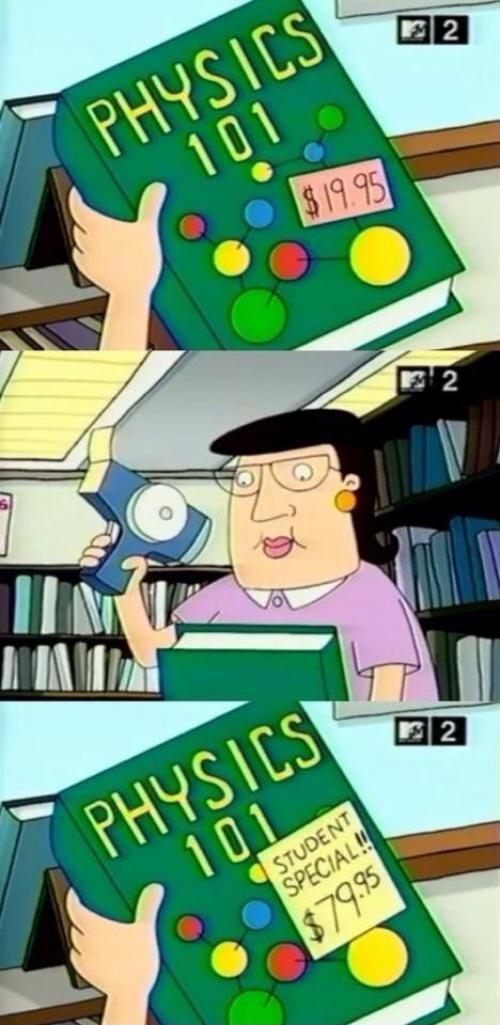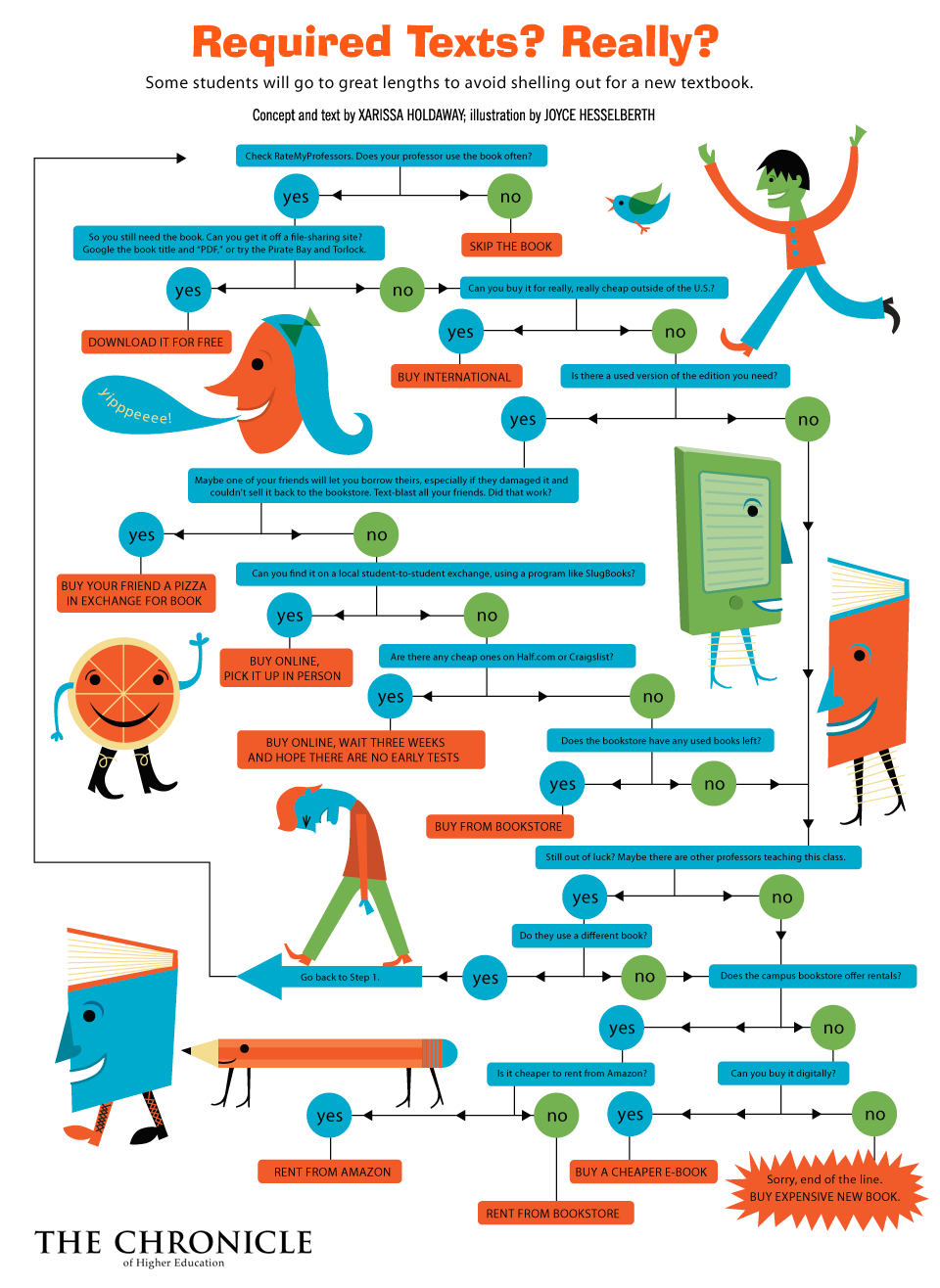The Importance of Your Textbook
For any class that you are in, it is your responsibility to obtain a copy of the textbook.
The textbook is more than just a source for you to look up problems. In college math courses, it is vital that you
read your mathematics textbook. If you are not reading the textbook, or if you wait until weeks into the course to obtain a copy of the textbook,
you are putting yourself at risk of failing the course.
Have a Copy of the Textbook by the First Day of Class
Often textbooks are expensive. This is usually due to publishers who often charge high
prices for books and use tactics that often force students to buy new editions each
year rather than acquire used copies.
Despite this, it is very important that you have a usable copy. Be careful about using old editions,
buying cheap pirated versions of the textbook,
or ordering a used copy from online that will not arrive until a month into the semester. If you don't have the correct version of
the textbook or you do not have the textbook in hand at the beginning of the semester, you are at a severe disadvantage in the course. The textbook is
one of the most important tools you have, and without it learning the material will be much more difficult.
Old Editions of Textbooks
Usually, new editions of books are created to correct typos or add valuable new material. However, many textbook publishers
will often come out with new editions of popular textbooks simply to make money. (If there is a new edition, students cannot use old
copies and have to purchase brand new editions at full price.) Many calculus textbooks, for example, come out with a new edition every year
precisely so that students cannot use used versions. Sometimes the new editions correct errors. Other times,
the new editions have small changes that are made solely so students cannot use old version --- for example, sections may be re-numbered or
exercises at the end of sections will be changed slightly or re-ordered. This is not fair or ethical behavior on the part of publishers,
but it is the way things are, and unfortunately professors and students must deal with it.
Because of this, you need to have the correct edition of the textbook being used in your course. If any
homework or reading is assigned from the textbook, the material in older editions may not match up correctly. Also, do not bother writing
to your professor asking if you can use an older edition. Your professor has no idea what changes the publishers made from
one edition to the next, so they usually can't tell you if an older edition will work for you or not. Also, due to the way publishers work, the answer is almost
always: "an old edition cannot be used".
International or Online Editions
Because students in other countries (particularly, second and third world countries) cannot afford to pay the high prices for
books that are paid in the U.S., some publishers create International Editions of their textbooks. International Editions are special cheaper
versions created for these markets in other countries. International editions of textbooks are often printed on lighter-weight paper,
cheaper bindings, or without color plates. They may also have slightly different content or different exercises than the U.S. edition.
In the past, there was dispute about whether it was legal to sell international editions
of textbooks in the U.S. However, in 2013
the U.S. Supreme Court ruled that
international edition textbooks that were acquired legally can be legally sold in the United States.
Although international editions of textbooks are often cheaper, be careful if purchasing them.
Sometimes international editions are identical to the U.S. version, but frequently
they are not. It may even be the case that the text in the sections is the same as the U.S. edition,
but the exercises are printed in a different order. You can't be sure unless you
carefully compare the international and U.S. editions side-by-side.
So, while international editions are much cheaper, there are some downsides:
- The quality of the book is usually lower.
- It is possible there may be differences from the U.S. edition, and you may not know this until you use the book.
- They are hard to resell after you're done with them. Many bookstores or
book resellers will not purchase international editions.
In addition, obtaining pirated versions of the textbook in an
electronic or PDF version is illegal and hurts the author (who is usually
not acting in an unscrupulous way and is often underpaid by the publisher to begin with).
Be Careful How You Choose to Save Money
If you need to save money, sacrificing the quality of your textbook is not the way to do it. Do not
be penny-wise and pound-foolish. You have already
spent a great deal for tuition and fees top attend college, and you are about to invest a great deal of time and work
to take this class and learn the material. It is in your best interest to make sure you have the
proper tools for your classes, even if that costs slightly more. If an old edition or international edition of the textbook is
defective in some way, or doesn't match the version your professor has, it can affect your performance in the class and your final grade.
So be careful that you don't make your task harder or compromise the amount you learn or risk failing the course,
just to save a few dollars.
Some Closing Thoughts
Textbook prices have skyrocketed in the past few decades.
Unfortunately, there is little that students and professors can do about this fact.


The following comedic flowchart appeared in a recent article in the Chronicle of Higher Education.

 Back
Back


